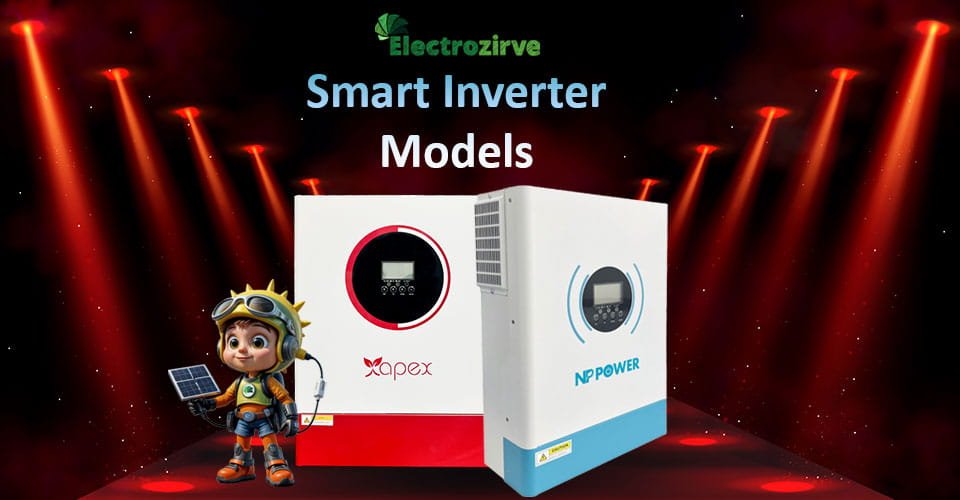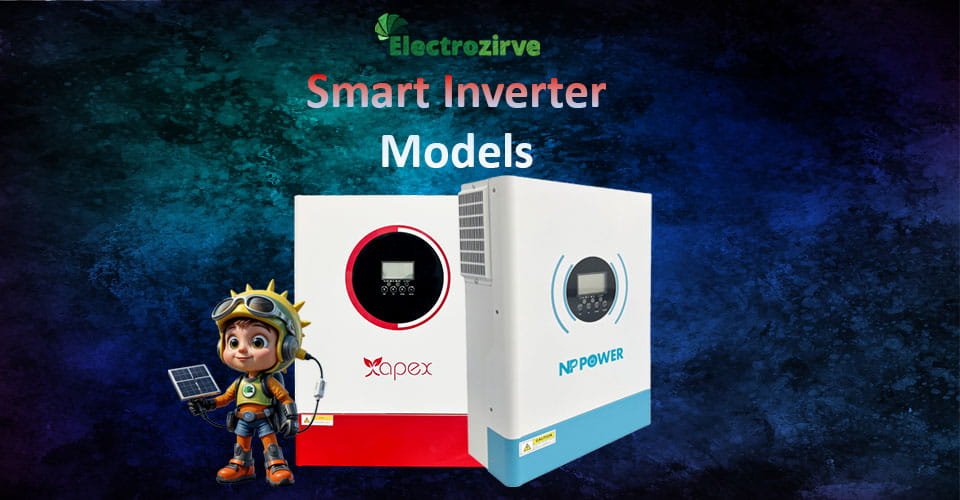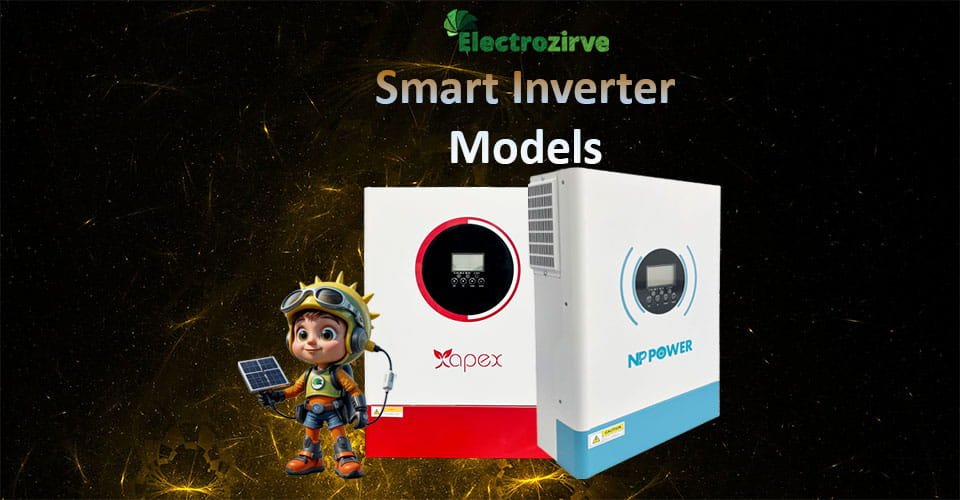
Modern energy systems require more than just basic power conversion — they need intelligence, flexibility, and long-term reliability. Our selection of high-efficiency inverters is designed to meet these expectations across residential, commercial, and mobile applications.
At Electrozirve Official, we bring together performance and precision. Our inverters are equipped with advanced control systems, offering seamless management between solar input, battery storage, and grid power. Ideal for off-grid solutions, caravans, boats, and homes, these products support smooth and uninterrupted energy flow, even during peak loads or outages.
What sets our range apart is its ability to adapt to different battery types including LiFePO4, GEL, and AGM Integrated features such as LCD displays, overload protection, and energy-saving modes ensure that users stay informed and protected. Our models vary in capacity, giving you the flexibility to choose the best match for your specific power requirements.
Thanks to real-time monitoring capabilities, you can track energy production and consumption through Bluetooth, Wi-Fi, or mobile applications — keeping you in full control no matter where you are. Whether you’re powering a cabin in the mountains or a mobile food truck in the city, a smart inverter brings stability to your system.
Each unit on this page is thoroughly tested, quality-assured, and backed by reliable technical support. We’re committed to helping you transition to a more sustainable energy future with confidence and ease.
Explore our product lineup and experience the future of energy conversion — engineered by Electrozirve, trusted by professionals.

In the transition to sustainable energy, having intelligent control over power conversion is essential. Our smart solar inverter range is designed to optimize solar energy systems with maximum efficiency, safety, and reliability.
Every product in this category features advanced digital technology, offering precise energy management across solar input, battery storage, and utility grid. These inverters ensure seamless switching and provide pure sine wave output, making them ideal for sensitive electronics and varied applications.
At Electrozirve Official, we prioritize both performance and adaptability. Our devices are compatible with lithium, gel, and AGM battery systems. Built-in MPPT solar charge controllers, overload protection, and LCD monitoring screens come standard in many models, delivering a smooth and secure user experience.
With Wi-Fi or Bluetooth connectivity, real-time monitoring is just a click away. Whether you’re on-site or remote, you can control and observe your system via mobile app or dashboard. This helps users stay energy-aware, cut costs, and increase the longevity of their power setups.
Choosing a smart solar inverter from our curated lineup means choosing future-proof technology backed by warranty, support, and real-world performance. Designed for durability and engineered to meet diverse energy demands, our products are trusted by professionals and energy-conscious users alike.
Common Usage Areas:

| Feature | Smart Inverter | Standard Inverter |
| Technology | Advanced microcontroller & digital systems | Basic analog or simple digital control |
| Solar Compatibility | Built-in MPPT solar charge controller | Often requires separate charge controller |
| Monitoring | Wi-Fi/Bluetooth remote monitoring available | Usually lacks remote monitoring |
| Grid Interaction | Supports grid-tie, hybrid, and off-grid modes | Mostly off-grid or backup-only use |
| Efficiency | Higher efficiency with adaptive algorithms | Moderate efficiency |
| Battery Management | Intelligent multi-type battery support | Basic or manual battery setting |
| Protection Features | Overload, short circuit, over/under voltage | Limited protection functions |
| User Interface | LCD or app-based control | LED indicators or simple display |
| Installation Complexity | May require more setup/configuration | Easier plug-and-play installation |
| Price Range | Higher due to smart features | More affordable for basic needs |
Efficient, intelligent, and future-ready — our smart inverter solar product line is designed to maximize the performance of modern energy systems. These inverters are built for seamless operation with solar panels and batteries, delivering clean, stable power in both off-grid and hybrid installations.
With built-in MPPT charge controllers and real-time monitoring features, they help users gain better control over their energy usage. Whether it’s for a mobile application or a permanent home installation, these devices offer flexibility, safety, and ease of use. Their compatibility with various battery types — including lithium, gel, and AGM — ensures broad integration across energy systems.
At Electrozirve Official, our goal is to provide reliable, durable, and intelligent solutions that meet the power needs of today and tomorrow. Choose a smart inverter solar unit to future-proof your system and enjoy stable, uninterrupted energy wherever you are.

A smart inverter is an advanced type of power inverter that not only converts DC (direct current) electricity from solar panels or batteries into AC (alternating current) for home or commercial use, but also integrates intelligent features such as real-time monitoring, energy optimization, and grid interaction capabilities.
Unlike traditional inverters, smart inverters come equipped with built-in MPPT (Maximum Power Point Tracking) charge controllers, allowing them to optimize the efficiency of solar energy conversion. They can communicate with other system components via Wi-Fi or Bluetooth, enabling users to track energy production, consumption, battery status, and even adjust settings remotely through mobile apps or web dashboards.
Many smart inverters also support hybrid functions — managing power from multiple sources (solar, battery, grid, generator) simultaneously. Some models are even capable of feeding excess electricity back into the grid, a feature essential for grid-tied systems in regions with net metering.
In summary, a smart inverter goes beyond basic power conversion. It acts as the brain of your energy system, offering greater control, safety, and performance — ideal for solar-powered homes, caravans, off-grid setups, and commercial energy solutions.

The key difference between a smart inverter and a standard inverter lies in their functionality, control systems, and integration capabilities.
A standard inverter primarily performs one task: converting DC (direct current) electricity from solar panels or batteries into AC (alternating current) for household or commercial use. It generally offers limited or no monitoring, basic battery compatibility, and minimal user interaction. Standard inverters are commonly used in simple off-grid or backup systems where advanced features aren’t required.
A smart inverter, on the other hand, offers a much more sophisticated and flexible solution. It not only converts DC to AC but also includes features like:
Smart inverters are designed to communicate with other components in a solar system, making them ideal for modern energy setups where efficiency, control, and scalability matter.
In short, if you’re looking for a solution with more automation, data tracking, and system flexibility, a smart inverter is the better choice.

While solar inverters play a crucial role in converting solar energy into usable electricity, they do come with a few disadvantages that should be considered when designing a solar power system:
Despite these drawbacks, the benefits of solar inverters — such as clean energy usage and long-term savings — often outweigh the disadvantages, especially when installed and maintained correctly.

Yes, a smart inverter can help save electricity — not by reducing consumption directly, but by optimizing energy usage and minimizing losses within a solar or hybrid energy system.
Smart inverters are equipped with features like MPPT (Maximum Power Point Tracking), which ensures that solar panels operate at their highest efficiency. This means more of the sun’s energy is converted into usable electricity, reducing dependency on the grid or backup generators.
Additionally, smart inverters intelligently manage energy flow between solar panels, batteries, and the grid. They can prioritize solar power when available, automatically switch to battery storage when needed, and use grid power only as a last resort — reducing overall energy bills.
Other ways smart inverters contribute to savings:
In summary, while a smart inverter doesn’t “generate” electricity savings on its own, its intelligent energy management leads to higher system efficiency and lower utility costs over time.